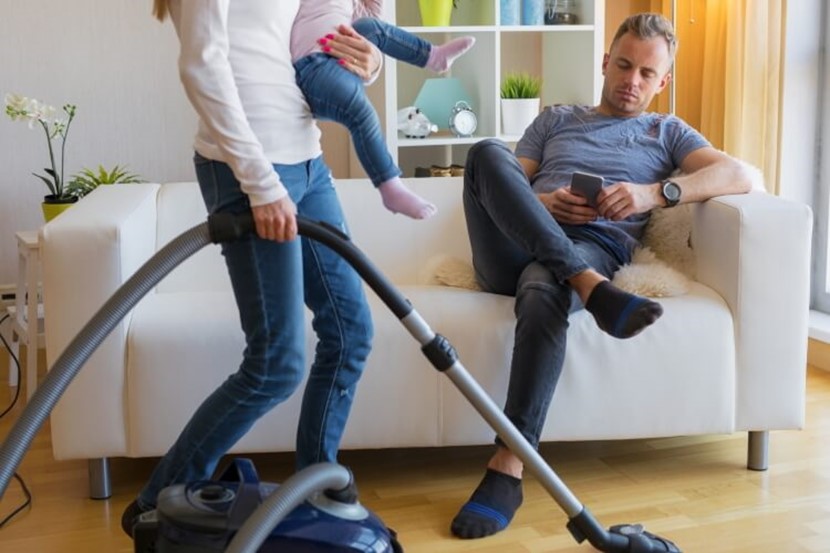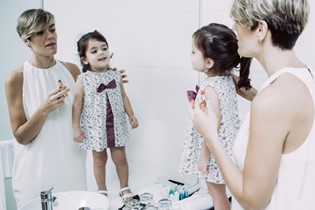Want more help around home? Here's how

How does the housework get parcelled out in your house? Are you responsible for most of the domestic chores, and are you starting to resent it? Emma Fahy explains how to get your partner to share more of the load - and keep both of you happy.
Every day, my partner gets up at 4am and heads off to work. On cold winter mornings, I lie in my warm, snuggly bed and listen to the rain, feeling quietly grateful that it's not me out there.
But by 10am, when I'm standing in the middle of the kitchen surrounded by hyperactive toddlers and chaotic mess, feeling more like a frazzled housewife than a domestic goddess, I must confess that I do envy him just a tiny bit. After all, he gets to escape the madness for the whole day, while my day revolves around changing nappies, what seems like constant mealtimes, and the hunt for the mythical bottom-of-the-laundry-basket.
According to a recent OHbaby! online poll, our household is fairly typical: In more than half of households surveyed, the at-home parent is responsible for the domestic chores. This may seem hardly surprising, given that the at-home partner spends the most time in the home, and, therefore, has the most opportunity to carry out the housework. But what is interesting is that of the group surveyed, 43% wished their partner would do more to help out around the house.
According to marriage counselor and relationships expert Dr John McEwan, therein lies the problem - it's not what each person in the relationship actually contributes, it's how each person feels about their contribution.
"If, for example, Mum is at home all day with the kids and is responsible for all of the household chores, and she's happy with that, then there's no problem," Dr McEwan says. "But if she's responsible for all of the household chores and spends her day resenting it, then that's where conflict occurs."
Conflict over sharing the load in relationships is a fairly new phenomenon. In previous generations, each person had very deined, traditional roles, so there was no basis for argument. And even earlier than that, people took in hired help to divide up the household labour.
Says Dr McEwan, "In years gone by, it wasn't unusual for families to outsource their domestic needs. As far back as Biblical times, couples employed cleaners and childcarers to help distribute the load more evenly.
"But then came the 1950s and the evolution of the 'super housewife', and perceptions changed - suddenly, women were expected to cook, clean, and raise the children, while their husbands were off earning a living.
"It's an ideal which has persisted well into the start of the new millennium. Despite the fact that more women than ever before are now combining motherhood with work outside the home, we still expect her to be able to maintain that 'super housewife' ideal. In families where one parent is at home full-time, the expectations are even more exact, and the division of labour between the working partner and the at-home partner is often skewed."
So what do you do if you're dissatisied with the way that domestic responsibilities are shared in your household? The solution is simple, says Dr McEwan: Communication. He outlines some simple communication-based strategies to help share the load in a way that works for each member of the household as an individual, and as a family unit.
I can, you can
As a starting point, Dr McEwan recommends making two lists. On one list, write the things that you are prepared to contribute to the running of the household, for example, doing the dishes, bathing the children, etc. On the second list, write the things that you'd like your partner to contribute to the running of the household. Then swap lists.
There will be some overlaps - things that you both agree on - and there may also be some points of difference. Once you know what each of you is prepared to do, you can look at dividing up the things that neither of you want to do in a manner that works for you both.Look for solutions instead of focusing on the negatives, Dr McEwan suggests focusing on possible solutions. "Think about what will make the whole experience lovelier for you as a family. How can you bring in joy so that, instead of viewing the situation as a chore, you view it as an important part of family life?" Are there things that perhaps you don't really enjoy doing, but that you can tolerate doing for the sake of having the household run more smoothly?
Confront resentment
Think about why you are feeling resentful about your role in the way domestic responsibilities are shared. For example, is it because you feel undervalued? Or because you feel like you are doing more than your fair share? Dr McEwan believes that resentment is almost always built on a wrong perception of the situation.
"The solution to resentment lies with addressing these wrong perceptions," he says. "If one person is feeling undervalued, it's quite likely the other person isn't aware of this, and we can't fix what we don't acknowledge." But he warns that we should be careful to avoid blame when addressing resentment. Accept that the resentment exists, then look for solutions, rather than dwelling on whose fault it might be.
Don't underestimate traditional roles
Despite what society tells us, there is nothing wrong with traditional male-female roles. In fact, according to Dr McEwan, they can be a useful starting point when dividing up domestic responsibilities.
Feedback from a recent poll of OHbaby! website members suggests that women are doing most of the cooking, cleaning and childcare, while men take care of "outside" chores such as putting out the rubbish, mowing the lawns, and household fix-it jobs.
This gender-biased division of labour may seem archaic, but there's a reason why these have evolved to become traditional roles - because they embrace some of the fundamental differences in male and female thinking. Women tend to derive satisfaction from nurturing, whereas men seem to need a more tangible result to show for their efforts.
Call in the professionals
If you can afford it, Dr McEwan recommends hiring a cleaner or other domestic helper to take over some of the chores. It needn't be horrendously expensive - it costs, on average, between $25-$40 per hour to hire a cleaner, and being able to hand over the time-consuming household jobs will free you up to spend more time focusing on the family.
If you're having trouble rationalising it, Dr McEwan puts it like this: When you are working, you might have, for example, an earning capacity of $50 per hour. So why would you spend your time off doing a $25-an-hour job like cleaning the bathroom?
Take time out!
As important as it is to spend quality time as a couple, and as a family, it's equally important to have time out for yourself. Agreeing on how to manage your time most effectively should also include time out for both partners. It might be a girls-only craft evening, Friday night drinks after work, a weekly yoga session, or even a night-school class. But, most importantly, says Dr McEwan, don't waste your time resenting your partner's time out - embrace it!
"You might have agreed that she will have every Saturday morning on her own to catch up with friends," he says, "but then on Saturday morning you find yourself sitting at home resenting that she's having time out. Don't! Get up and find something for yourself to do during that time instead. Take the kids to the park, or cook a fancy brunch. Do something that you enjoy!"
The times, they are a-changing…
Once you come to an arrangement that works for you, your partner and your family, embrace it, but don't be afraid to make changes. Family life is not static, it is constantly changing - children get older, work commitments change - so what works for you when your children are babies might not necessarily be the perfect fit once they start preschool. And if the at-home partner decides to return to work, whether it be part-time or full-time, the way you share the load will need re-evaluating. Dr McEwan recommends reviewing your previous arrangements and looking at how to tweak them to it your changing circumstances.
"Our current generation is certainly facing a lot more pressure than previous generations," he says. "There is more encouragement to destroy relationships that might be having problems than to fix them, so it's important to be proactive. If we can identify areas of conflict before they occur, we're already one step ahead."
Dr John McEwan PhD is a registered counsellor who works with senior managers and professionals facing stress as a result of health, relationship, or business issues. He has a particular interest in working with couples to rediscover the joy in their relationships. To find out more, visit www.drstress.co.nz

AS FEATURED IN ISSUE 2 OF OHbaby! MAGAZINE. CHECK OUT OTHER ARTICLES IN THIS ISSUE BELOW

















